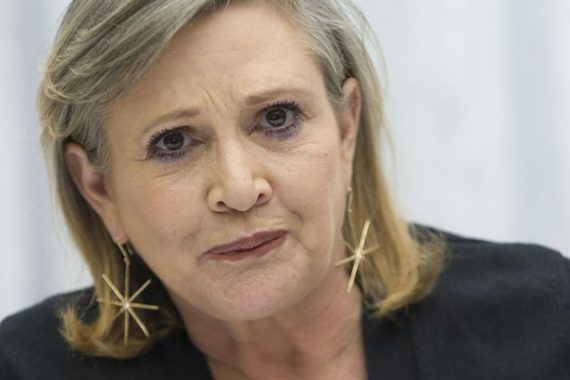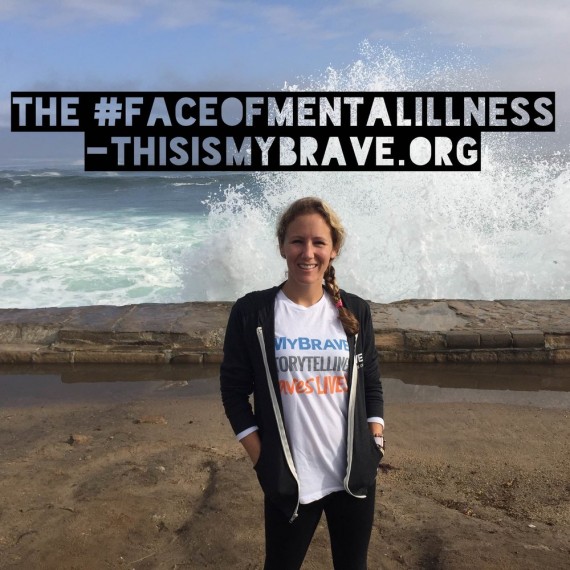
(12-28-16) The Washington Post asked Jennifer Marshall, one of my favorite advocates and co-founder of This Is My Brave, to write about Carrie Fisher’s death. Great job Jennifer!
Carrie Fisher’s openness about her bipolar disorder motivated me to talk about mine
Soon after I was diagnosed with bipolar disorder in my late 20s, I remember looking for stories of people who were living successful lives with the condition. I had been through the trauma of losing touch with reality, a symptom of my illness during manic episodes, and needed to find examples of people who could show me that it got better, that I could find stability. Carrie Fisher was one of the first celebrities I learned also had bipolar disorder, and she had found a way to cope: through writing, performing and talking openly about her mental illness. Her openness was inspiring, refreshing and motivated me to start writing about my illness, too.
What impressed me the most about the way Fisher spoke about the horrific and unpredictable ups and downs of bipolar disorder, and also her battle with drugs and alcohol, was how she did so without shame. She admitted it took her a long time to get to that point, but once she did there was no looking back. Fisher had pride for her struggle. She turned her “issues” into consumable entertainment in the form of books and plays for which she received rave reviews and awards.
Fisher made it easier for a person like me to “come out” about having mental illness.
I read her memoir “Wishful Drinking” several years ago. She had a stretch of not sleeping for six days and the hallucinations that followed were eerily similar to what mine felt like each of the four times I’ve been hospitalized for mania. Turning on the TV and thinking everything was about her, the terrifying feeling of dying, and not knowing she was signing herself into a locked psychiatric ward. I had been there, too.
In an interview with “20/20’s” Diane Sawyer in December 2000, Fisher said, “Losing your mind, which is what happened, is a terrible thing. But once it’s gone, it’s fine. It’s completely fine because there’s no part of you left that knows the rest of it is missing.” I could relate to her words with every ounce of my being. Those of us who live with bipolar disorder may lose our minds occasionally, but if we’re lucky, they aren’t lost for long.
It’s devastating and heartbreaking to lose an icon like Fisher, and even more so for someone like myself who had an overwhelming amount of gratitude for her ability to normalize conversations surrounding mental illness. When celebrities use their platforms to bring awareness to important issues like equality and they do so on the scale that Fisher did, societal change begins to take place. She paved the way for other celebrities to feel comfortable admitting their struggles, and each time this happens, regular people find courage in the vulnerability of superstars.
Just a month before her death, in her final advice column for The Guardian, Fisher answered a question from a reader about coping with a recent diagnosis of bipolar disorder.
“Think of it as an opportunity to be heroic — not ‘I survived living in Mosul during an attack’ heroic, but an emotional survival,” Fisher wrote. “An opportunity to be a good example to others who might share our disorder. That’s why it’s important to find a community — however small — of other bipolar people to share experiences and find comfort in the similarities.”
After 18 months of writing about my illness under an alias, I started using my real name. So many people with a shared experience responded positively that in 2013 I started a nonprofit, This Is My Brave, built on this same concept of truth-sharing through personal storytelling and the arts. How one person being brave on stage, sharing their diagnosis and struggle and ultimately how they found recovery, serves as a catalyst for those who witness the performance to find the courage to share their own stories. Sharing these stories helps to break down the fear and ignorance that still exists about mental illness.
I wish Fisher could have seen a This Is My Brave show. I know she would have been honored to know how many people, in my organization and the mental health community in general, found inspiration from her openness. In her own words, Fisher revealed at the end of “Wishful Drinking” that she’s baffled by the lingering stigma surrounding mental illness, specifically bipolar disorder. She writes, “At times, being bipolar can be an all-consuming challenge, requiring a lot of stamina and even more courage, so if you’re living with this illness and functioning at all, it’s something to be proud of, not ashamed of.”
I am proud of the way Fisher taught the world to not be afraid of mental health issues, but instead to embrace them as the life challenges they are. She was a dedicated, passionate and humble advocate whose wry humor and wit made me swell with pride. Even though our world has lost an incredibly talented human being, the legacy Fisher left behind will live on forever.
Jennifer Marshall was diagnosed with type 1 bipolar disorder in 2006, and it has become her purpose in life to encourage people to talk openly about mental illness to end the stigma. She writes about her experience on her blog, BipolarMomLife and is the co-founder and executive director of the nonprofit This is My Brave, Inc., a nonprofit organization that serves as a platform for individuals to share their true, personal stories of overcoming mental illness through poetry, original music, comedy and personal essay, to end the stigma.




